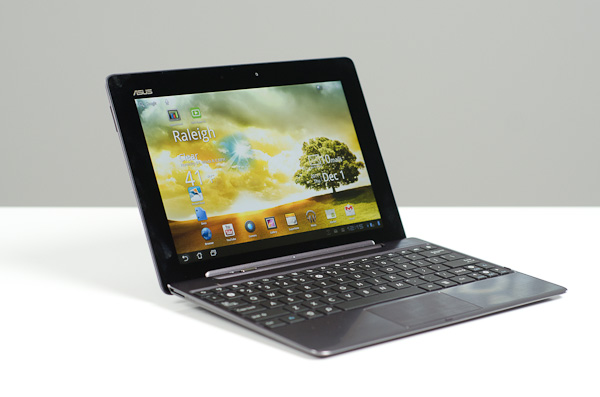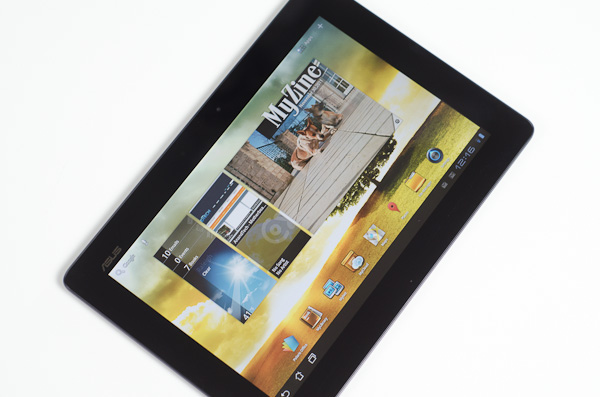ASUS Eee Pad Transformer Prime & NVIDIA Tegra 3 Review
by Anand Lal Shimpi on December 1, 2011 1:00 AM ESTFinal Words
Assuming the WiFi and minor dock issue I encountered aren't widespread (ASUS insists they aren't), I am comfortable calling the Eee Pad Transformer Prime the absolute best Android tablet on the market today. The hardware looks and feels great. ASUS picked the best display possible and married it to some really good industrial design. I was impressed with the styling of the Zenbook, and the Prime continues to position ASUS as a purveyor of high quality mobile devices.
At the same time, NVIDIA has finally delivered an SoC capable of delivering the sort of smooth experience we'd expect from a $500 tablet. Honeycomb was a great first attempt by Google at a tablet OS, but Tegra 3 really makes the whole experience complete. Everything you'd expect to be smooth, is finally smooth. Video playback is no longer an issue, the Prime and Tegra 3 can finally play back virtually anything you'd want to throw at it. Thank goodness.
As good as the combination is today, I admit that I still can't wait to put Ice Cream Sandwich on this thing. Even more polish on the OS side (and the absence of any hardware issues during the testing process) would've easily catapulted the Prime into editor's choice territory.
Battery life is the big unknown at this point. At worst it's roughly on par with the old Eee Pad Transformer. I'll know more in the coming days, but 9 hours of continuous use isn't bad. The question is how much better will it be as we start playing with the available power options? I'm also curious to see what having four cores does to web page loading performance. There's clearly an impact on JavaScript rendering, but what about the overall real world experience? In my testing I was limited by the WiFi issue I mentioned earlier, but I hope to have an answer to this soon enough.
The inevitable iPad comparison is, well, inevitable. I still firmly believe there's not a whole lot of iOS/Android cross shopping. If you want an iPad, that's what you should buy. Android isn't an iOS substitute, just as iOS isn't an Android substitute. You can do similar things on both, but personal preference will really determine what suits you the best.
I'll have more coverage on the Prime over the coming days, but if you're making your decision before then: this is the Android tablet to get.
Update: ASUS has removed GPS support from the Prime's official spec sheet. Check out our update here as well as our follow-up to the review.












204 Comments
View All Comments
MiSoFine - Thursday, December 1, 2011 - link
my 2 cents...get a Kindle fire. Easier UI for non tech parents & it's still android; cheaper also. Or a Vizio vTab.I got my Mom a Kindle Fire, kids a vTab (they will at least attempt to try to figure it out) & myself a (preordered) Prime.
steven75 - Saturday, December 3, 2011 - link
Considering the complete lack of Android tablet apps, that doesn't seem wise.Enkur - Thursday, December 1, 2011 - link
What is that android app that shows the per core CPU activity in the screenshot above?Lucian Armasu - Thursday, December 1, 2011 - link
Anand, just remember to note, or even test the real world performance when iPad 3 and other high resolution tablets arrive.In your benchmarks they should be showing even faster performance at 720p with the upcoming faster chips, but that might not be the case in the real world. Remember how low FPS the iPhone 4 got with its 4x the resolution over iPhone 3GS, when tested at native resolution?
That should be happening to iPad 3 and the others, too, even if the chips get faster by then. I would wait until at least 2013 to get a 2k resolution tablet, so I won't be that significantly impacted by it.
Lucian Armasu - Thursday, December 1, 2011 - link
Also is there a way to compare the graphics between Tegra 3 and iPad 2 without comparing the benchmark numbers? Like comparing the best graphics on Tegra 3 versus the best one on iPad 2, and notice the differences between them? I really don't think the benchmark numbers tell the whole truth.I think Tegra 3 games may even look/work better than A5 games, thanks to its quad core CPU, too, but I figure you should be able to tell that better than me since you have both.
vision33r - Thursday, December 1, 2011 - link
I disagree, in PC and Console world, the GPU is the determining factor in game graphics and performance.You can take a Core i7 using HD3000 integrated graphics and compare it with a Core i3 with an ATI 4850 and it will spank the Core i7 in gaming performance.
That's what's happening here is the Tegra 3's GPU is underwhelming from a graphics chip maker.
Very few mobile games imo need even dual core, they need the proper graphics acceleration and that's where Android fragmentation has hurt game development.
They have to code games for the lowest common denominator instead of optimizing games for Tegra.
metafor - Thursday, December 1, 2011 - link
That doesn't necessarily translate to the mobile world. On the desktop side, CPU's have gotten so fast that just about any task a game can throw at it -- physics, AI, audio, etc. -- can be done without bottlenecking the game while the shading/rendering on the GPU is still being pushed.On the mobile side, this may not be true (yet) as the CPU's are -- comparatively -- fairly underpowered against their desktop counterparts. Couple this with the fact that the GPU is taxed to push out less pixels and one could easily see situations where the CPU becomes the bottleneck.
As mobile CPU's get faster -- especially with the A15/Krait generation -- this will become less and less of an issue especially as games make use of NEON to do their computationally heavy tasks and we'll get to a point where the GPU is the only bottleneck left.
But I don't see that happening until we hit the ~2.5GHz dual A15/Krait level.
vision33r - Thursday, December 1, 2011 - link
Very few Android games that I've seen are properly optimized unless they got that Optimized for Tegra logo. Otherwise most games do not take advantage of GPU acceleration.On iOS almost all games has some sort of GPU assist. Take Plants vs Zombies, the iOS version is perfect. The Android HD version has lower animation and graphics.
Almost all Gameloft games perform smoother on iOS than on Android.
metafor - Thursday, December 1, 2011 - link
Well yes. But the point is that with a higher performance CPU or group of CPU's, it is possible to have things that would be bottlenecked in a mobile device -- such as physics, AI, etc. -- be more complex and provide better visuals.Whether or not that has been done is another story. But you can hardly blame application devs for pouring more focus into iOS. The iPad is still what, ~90% of the tablet market? Moreover the App Store brings in way more revenue -- which the developers get a cut of -- than Android Market has thus far.
That will hopefully change over time.
steven75 - Saturday, December 3, 2011 - link
The problem with that theory is iPhones still bring in vastly more revenue for developers than android phones, despite the latter having higher market share.